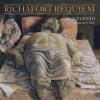Texte paru dans: / Appeared in:
*

International Record Review - (09/2012)
Pour
s'abonner / Subscription information
Hyperion
CDA67959

0034571179599 (ID240)
Consultez toutes les évaluations recensées pour ce cd
~~~~ Reach all the evaluations located for this CD

The Richafort Requiem is one of those works that, once you have heard it (or sung it), makes you desperate to repeat the experience. It is a cream cake of a piece, substantial, lush in texture and very moving. Written for six voices, it is one of the great achievements of the ‘post-Josquin generation’ — and that is a compliment indeed, so rich was the period. Stephen Rice’s excellent booklet notes place the work firmly in that context, explaining the technical procedures employed by Richafort that clearly owe a debt to Josquin; the Requiem Mass is surrounded by thematically related works by Josquin himself, Apenzeller, Gombert and Vinders.
Other excellent recordings exist, by the Huelgas Ensemble under Paul van Nevel and La Chapelle du Roi under Alistair Dixon (there is another by the Vox Early Music Ensemble, which I have not heard), but, good as they are, Cinquecento outclasses them both. Not only do the performances here range from genuine tenderness (Josquin’s Nymphes, nappés literally stops you in your tracks, so sublimely moving is it) to majestic splendour (try the ‘ Sanctus’ of the Requiem), but the balance is perfect and the melodic lines are absolutely clear, so that every detail of Richafort’s remarkable contrapuntal writing can be heard. That clarity is also, of course, in part due to the excellence of the recording, made by Markus Wallner at the Kloster Pernegg in Austria. By contrast, van Nevel’s recording has a little too much reverberation, so that some of the detail is not as clear as it might be, but any Richafort convert will, nevertheless, require that recording too, containing as it does other outstanding works by the master. Dixon and La Chapelle du Roi place the work intriguingly in the context of the exequies for King Philip II of Spain, with other appropriate repertoire. The group is quite large, however, and so lacks the intimacy and flexibility of Cinquecento.
The other works on the disc are given similarly wonderful performances. Josquin’s Nymphes des bois actually brought tears to my eyes, so tenderly moving is the singing, and Cinquecento’s imploring rendition of the masterpiece that is Miserere mei, Deus is surely perfect in the way it balances a profound understanding, and projection, of its intricate counterpoint with its vast melodic sweep. Similarly, I have never heard such a heart stopping rendition of Gombert’s extraordinarily complex Musae Jovis.
If I could nominate this recording as
‘Outstanding’ twice over, I would do so, for I have run out of superlatives.
It is, quite simply, sublime.
Fermer la fenêtre/Close window
Cliquez l'un ou l'autre
bouton pour découvrir bien d'autres critiques de CD
Click either button for many other reviews


